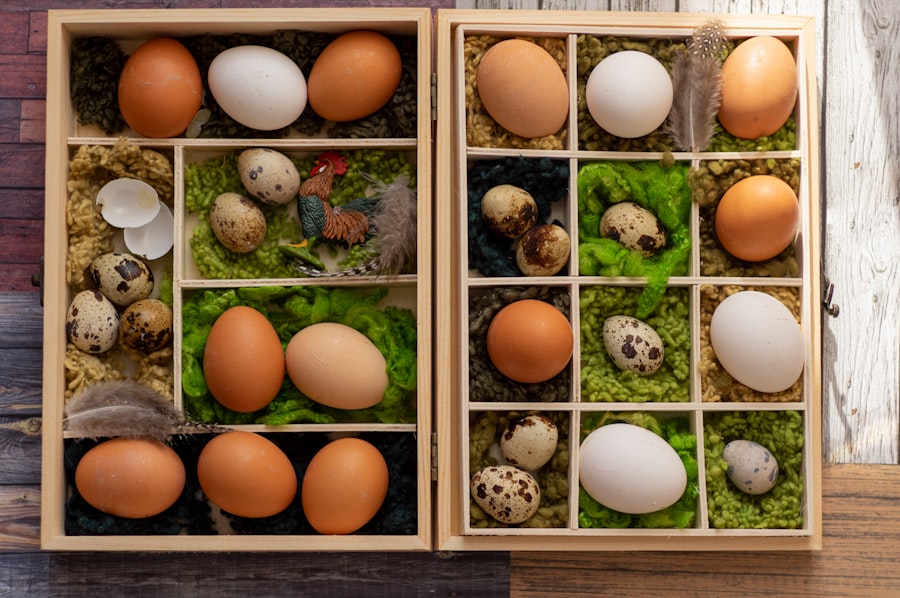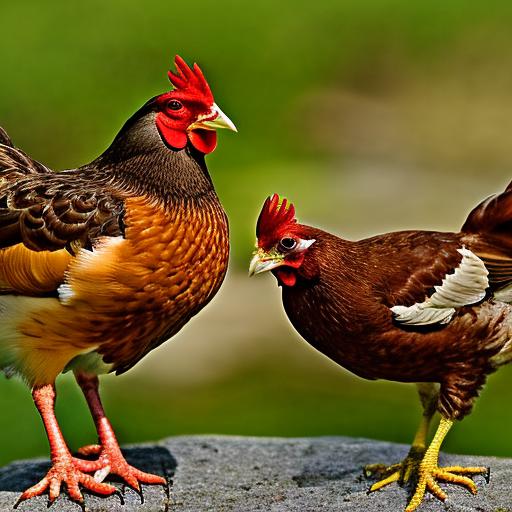Keeping chickens in Pennsylvania has become increasingly popular in recent years. More and more people are realizing the benefits of raising their own chickens, from having a constant supply of fresh eggs to using chicken manure as fertilizer for their gardens. In this article, we will explore the laws and regulations for keeping chickens in Pennsylvania, the benefits of raising chickens in your backyard, how to choose the right breed of chickens, building a coop, feeding and caring for your chickens, common health issues and diseases, protecting your chickens from predators, selling eggs legally, joining a chicken community, and the pros and cons of keeping chickens in Pennsylvania.
Key Takeaways
- Understanding the laws and regulations for keeping chickens in Pennsylvania:
- A permit is required for keeping chickens in some cities and towns.
- There are restrictions on the number of chickens you can keep based on the size of your property.
- Benefits of raising chickens in your backyard in Pennsylvania:
- Fresh eggs are a great source of protein and nutrients.
- Chickens can help control pests and weeds in your garden.
- Choosing the right breed of chickens for your Pennsylvania backyard:
- Consider factors such as egg production, temperament, and climate adaptability.
- Popular breeds for Pennsylvania include Rhode Island Reds and Plymouth Rocks.
- Building a coop: essential requirements for raising chickens in Pennsylvania:
- Coops should be secure, well-ventilated, and provide enough space for chickens to move around.
- Nesting boxes and roosting bars are important features to include.
- Feeding and caring for your chickens in Pennsylvania: tips and tricks:
- Chickens need a balanced diet of feed, water, and occasional treats.
- Regular cleaning and maintenance of the coop is important for their health.
- Common health issues and diseases in chickens in Pennsylvania:
- Common issues include mites, lice, and respiratory infections.
- Regular health checks and vaccinations can help prevent diseases.
- How to protect your chickens from predators in Pennsylvania:
- Common predators include raccoons, foxes, and hawks.
- Secure fencing and locking coops at night can help prevent attacks.
- Selling eggs: legal requirements and best practices in Pennsylvania:
- A permit is required for selling eggs in Pennsylvania.
- Best practices include proper labeling and storage of eggs.
- Joining a chicken community in Pennsylvania: resources and networks:
- Local groups and online forums can provide support and advice for chicken owners.
- The Pennsylvania Poultry Association is a great resource for information and events.
- Pros and cons of keeping chickens in Pennsylvania: is it right for you?
- Pros include fresh eggs, pest control, and a fun hobby.
- Cons include the cost of building and maintaining a coop, and the responsibility of caring for animals.
Understanding the Laws and Regulations for Keeping Chickens in Pennsylvania
Before you embark on your chicken-keeping journey, it is important to familiarize yourself with the laws and regulations for keeping chickens in Pennsylvania. Each municipality may have its own specific rules, so it is crucial to check with your local government or zoning office to ensure that you are in compliance. Generally, there are restrictions on the number of chickens you can keep, the distance between your coop and neighboring properties, and the type of structures allowed for housing chickens.
It is important to follow these laws and regulations to avoid fines or legal issues. By doing so, you can ensure that you are being a responsible chicken owner and a good neighbor. Additionally, following these regulations helps to maintain the health and safety of your chickens and the surrounding community.
Benefits of Raising Chickens in Your Backyard in Pennsylvania
There are numerous benefits to raising chickens in your backyard in Pennsylvania. One of the most obvious benefits is having a constant supply of fresh eggs. Not only do fresh eggs taste better than store-bought ones, but they also have higher nutritional value. You can also have peace of mind knowing exactly how your chickens are raised and what they are fed.
Another benefit is the cost savings. Raising your own chickens can significantly reduce your grocery bill, especially if you consume eggs regularly. Additionally, chickens produce manure, which can be used as fertilizer for your garden. This natural fertilizer is rich in nutrients and can help improve the health and productivity of your plants.
Choosing the Right Breed of Chickens for Your Pennsylvania Backyard
When it comes to choosing the right breed of chickens for your Pennsylvania backyard, there are several factors to consider. Different breeds have different characteristics, such as egg-laying ability, temperament, and cold hardiness. Some breeds are known for their prolific egg-laying, while others are more suitable for meat production. It is important to choose a breed that aligns with your goals and preferences.
In terms of climate, Pennsylvania experiences four distinct seasons, so it is important to choose breeds that can tolerate both cold winters and hot summers. Some cold-hardy breeds include Rhode Island Reds, Plymouth Rocks, and Wyandottes. These breeds have thick feathers and can withstand low temperatures. On the other hand, some heat-tolerant breeds include Leghorns, Sussex, and Australorps. These breeds have lighter feathers and are better suited for hot climates.
Building a Coop: Essential Requirements for Raising Chickens in Pennsylvania
Building a chicken coop is an essential requirement for raising chickens in Pennsylvania. The coop provides shelter and protection for your chickens from the elements and predators. When building a coop, there are several essential requirements to consider.
Firstly, the size of the coop should be appropriate for the number of chickens you plan to keep. The general rule of thumb is to provide at least 4 square feet of space per chicken inside the coop and 10 square feet per chicken in the outdoor run. This allows enough room for the chickens to move around comfortably.
Ventilation is another important aspect of a chicken coop. Good ventilation helps to regulate temperature and prevent moisture buildup, which can lead to respiratory issues in chickens. It is recommended to have windows or vents that can be opened and closed as needed.
Predator-proofing your coop is crucial to ensure the safety of your chickens. This includes using sturdy materials, such as hardware cloth, for the walls and floor of the coop. Additionally, make sure to secure all openings, such as windows and doors, with predator-proof latches. Regularly inspect the coop for any potential entry points and reinforce them if necessary.
Feeding and Caring for Your Chickens in Pennsylvania: Tips and Tricks

Feeding and caring for your chickens in Pennsylvania requires some knowledge and attention. Providing fresh water is essential, as chickens need access to clean water at all times. Make sure to clean and refill their water containers regularly to prevent contamination.
A balanced diet is also important for the health and productivity of your chickens. A commercial chicken feed that is specifically formulated for laying hens is a good starting point. This feed contains the necessary nutrients, such as protein, vitamins, and minerals, to support egg production. You can also supplement their diet with kitchen scraps, fruits, vegetables, and grains.
Monitoring your chickens’ health is crucial to catch any potential issues early on. Regularly check their feathers, eyes, beaks, and feet for any signs of injury or disease. Keep an eye out for changes in behavior or egg production, as these can be indicators of health problems. If you notice anything unusual, consult a veterinarian who specializes in poultry.
Common Health Issues and Diseases in Chickens in Pennsylvania
Chickens in Pennsylvania may face common health issues and diseases that can affect their well-being and egg production. Some common health issues include respiratory infections, parasites (such as mites and lice), bumblefoot (an infection on the foot), and egg-laying problems.
To prevent these health issues, it is important to provide a clean and dry environment for your chickens. Regularly clean the coop and remove any wet bedding or droppings. Additionally, practice good biosecurity measures, such as quarantining new chickens before introducing them to the flock and regularly disinfecting equipment.
If you suspect that your chickens are sick, it is important to seek veterinary care. A veterinarian who specializes in poultry can diagnose and treat the specific health issue or disease. They can also provide guidance on preventive measures to keep your flock healthy.
How to Protect Your Chickens from Predators in Pennsylvania
Pennsylvania is home to a variety of predators that pose a threat to chickens, such as raccoons, foxes, hawks, and snakes. Protecting your chickens from these predators is essential to ensure their safety.
One of the most effective ways to protect your chickens is by installing a sturdy fence around their coop and outdoor run. The fence should be buried at least 12 inches deep to prevent predators from digging underneath. Additionally, consider using hardware cloth instead of chicken wire, as it is more durable and provides better protection against predators.
Motion-activated lights can also be effective in deterring nocturnal predators, such as raccoons. These lights turn on when they detect movement, scaring away potential threats. Another option is to use predator deterrents, such as noise-making devices or predator decoys.
Regularly inspect the coop for any potential entry points and reinforce them if necessary. Make sure that windows and doors are securely closed at night. Consider using predator-proof latches that are difficult for predators to manipulate.
Selling Eggs: Legal Requirements and Best Practices in Pennsylvania
If you are interested in selling eggs from your backyard flock in Pennsylvania, there are legal requirements that you must follow. The Pennsylvania Department of Agriculture requires egg producers with 3,000 or more laying hens to obtain an egg dealer license. This license ensures that the eggs are produced and handled in a safe and sanitary manner.
Even if you have fewer than 3,000 laying hens, it is still important to follow best practices for selling eggs. Properly label your eggs with the date of packaging, your name or farm name, and a statement indicating that the eggs are not for human consumption if they are unwashed. Store the eggs in a cool place to maintain their freshness and quality.
Joining a Chicken Community in Pennsylvania: Resources and Networks
Joining a chicken community in Pennsylvania can provide valuable support and advice for both new and experienced chicken keepers. There are several resources and networks available for chicken keepers in Pennsylvania.
Local Facebook groups and forums are a great way to connect with other chicken keepers in your area. These groups often share tips, advice, and resources specific to your region. You can also find local poultry shows and events where you can meet other chicken enthusiasts and learn from experienced breeders.
The Pennsylvania Department of Agriculture also provides resources for poultry owners, including information on biosecurity, disease prevention, and regulations. They offer workshops and educational materials to help poultry owners stay informed and up to date.
Pros and Cons of Keeping Chickens in Pennsylvania: Is it Right for You?
Before deciding to keep chickens in Pennsylvania, it is important to consider the pros and cons and evaluate whether it is the right choice for you. Some of the pros include having a constant supply of fresh eggs, cost savings on groceries, and the ability to use chicken manure as fertilizer for your garden. Additionally, raising chickens can be a rewarding hobby that allows you to connect with nature and learn about sustainable living.
However, there are also some cons to consider. Keeping chickens requires time, effort, and resources. You will need to invest in a coop, feed, bedding, and other supplies. Chickens also require daily care, including feeding, watering, and cleaning. Additionally, there may be restrictions and regulations in your area that you need to comply with.
It is important to evaluate your lifestyle, resources, and commitment level before deciding to keep chickens. Consider whether you have the time and energy to care for them properly and whether you have the necessary space and infrastructure. It may also be helpful to talk to other chicken keepers in your area to get a better understanding of what it entails.
Keeping chickens in Pennsylvania can be a rewarding and fulfilling experience. From the benefits of fresh eggs and cost savings to the joy of connecting with nature, there are many reasons why people choose to raise their own chickens. However, it is important to understand the laws and regulations, choose the right breed, build a suitable coop, provide proper care and nutrition, protect against predators, and follow best practices for selling eggs.
By doing your research, seeking advice from experienced chicken keepers, and being prepared for the responsibilities involved, you can create a safe and healthy environment for your chickens and enjoy the many benefits that come with raising them in your Pennsylvania backyard.
If you’re wondering about keeping chickens in Pennsylvania, you’ll definitely want to check out this informative article on chicken coop designs. Whether you’re looking for inspiration for your own coop or simply curious about different options, this article from Poultry Wizard provides valuable insights. From the practical considerations of a chicken coop in Chester, SC (link: https://poultrywizard.com/keeping-chickens/chicken-coop-chester-sc/) to creative interior ideas (link: https://poultrywizard.com/keeping-chickens/chicken-coop-interior-ideas/), this resource covers it all. You can also explore their top 10 chicken coop designs (link: https://poultrywizard.com/keeping-chickens/chicken-coop-10/) for even more inspiration.
FAQs
What are the laws regarding keeping chickens in Pennsylvania?
In Pennsylvania, laws regarding keeping chickens vary by municipality. Some cities and towns have specific ordinances that regulate the number of chickens allowed, coop requirements, and distance from neighboring properties. It is important to check with your local government to ensure you are following all regulations.
How many chickens can I keep in Pennsylvania?
The number of chickens you can keep in Pennsylvania depends on your local ordinances. Some municipalities have no restrictions, while others limit the number of chickens to a certain amount per acre of land. It is important to check with your local government to ensure you are following all regulations.
Do I need a permit to keep chickens in Pennsylvania?
In most cases, you do not need a permit to keep chickens in Pennsylvania. However, some municipalities may require a permit or registration. It is important to check with your local government to ensure you are following all regulations.
What are the requirements for a chicken coop in Pennsylvania?
The requirements for a chicken coop in Pennsylvania vary by municipality. Some cities and towns have specific ordinances that regulate the size, construction, and location of chicken coops. It is important to check with your local government to ensure you are following all regulations.
Can I keep roosters in Pennsylvania?
In Pennsylvania, some municipalities allow roosters while others do not. It is important to check with your local government to ensure you are following all regulations.
What are the health risks associated with keeping chickens?
Chickens can carry diseases such as salmonella, avian influenza, and Newcastle disease. It is important to practice good hygiene when handling chickens and their eggs to reduce the risk of illness. Additionally, chickens can attract pests such as rodents and flies, which can also pose health risks.
Meet Walter, the feathered-friend fanatic of Florida! Nestled in the sunshine state, Walter struts through life with his feathered companions, clucking his way to happiness. With a coop that’s fancier than a five-star hotel, he’s the Don Juan of the chicken world. When he’s not teaching his hens to do the cha-cha, you’ll find him in a heated debate with his prized rooster, Sir Clucks-a-Lot. Walter’s poultry passion is no yolk; he’s the sunny-side-up guy you never knew you needed in your flock of friends!







